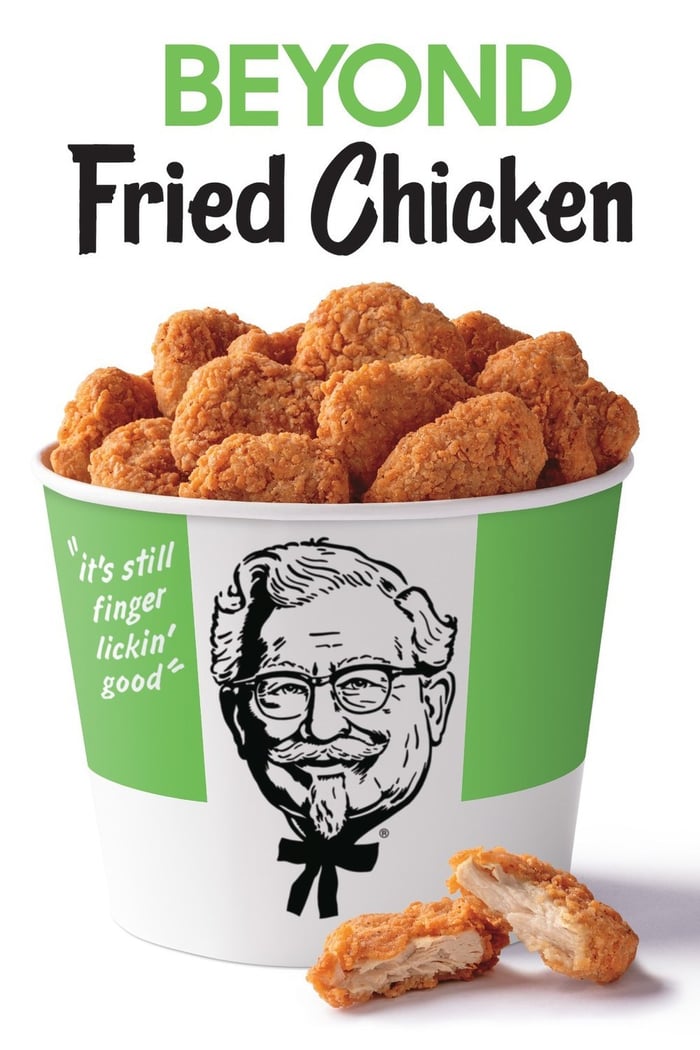As of this writing, there's never been a better time for normal investors to buy shares of plant-based meat company Beyond Meat (BYND 4.78%). The company had its initial public offering (IPO) in May 2019, priced at $25 per share. However, when the stock hit the public market, it opened at $46 per share before closing that first day at $65.75. Unless you were a company insider, an IPO investor, or just super quick that fine May morning, you've never been able to get shares of Beyond Meat cheaper than you can right now.
That fact may compel people to ponder whether now is a good time to buy Beyond Meat stock. The answer is complicated, but one thing's for sure: The company doesn't plan to slow down at all in 2020. On the contrary, it's aggressively pursuing its biggest year yet.

Image source: Beyond Meat.
Beyond Meat's 2020 plans
In February, Beyond Meat reported impressive 2019 financial results. Its annual revenue grew 239% to $298 million, and its profitability improved with the increased scale. The company reported a net loss on the year of $12.4 million, down significantly from its net loss of $29.9 million in 2018.

Image source: Kentucky Fried Chicken.
In 2020, Beyond Meat intends to continue its torrid top-line growth. Management guided for $490 million to $510 in revenue, which represents 64% to 71% growth year over year. Furthermore, the company is currently running menu item trials at McDonald's and Kentucky Fried Chicken (owned by Yum! Brands). If these go well, permanent menu item launches could also be on the docket this year.
However, its revenue guidance is not dependent on any new restaurant partners. Its guidance is solely based on existing distribution partners. If any new partners do come on board in 2020, it would only push revenue guidance higher.
International growth is another opportunity in 2020. In the company's prospectus, it specifically mentioned the European Union, the Middle East, and 28 individual countries outside the U.S. where it had already registered its trademark. One of those countries is China. In a recent interview with Yahoo! Finance, CEO Ethan Brown vowed to enter China later this year despite the current COVID-19 pandemic -- also not accounted for in this year's revenue guidance.
This growth is costly: Beyond Meat isn't guiding for a profit in 2020. But Brown believes profits are best sacrificed for now as the company aggressively pursues market share around the world.
But there's a problem
Beyond Meat distributes its products in two ways. It distributes through grocery stores so consumers can cook and eat at home, but it also deals with various restaurant partners, offering branded Beyond Meat menu items. In 2019, Beyond Meat's restaurant sales nearly quadrupled and made up 51% of total revenue -- an important milestone.
Under ordinary circumstances, that would be worth cheering. However, the COVID-19 pandemic has forced restaurants worldwide to limit restaurant seating or close their doors entirely. For example, Dunkin' Brands (an important Beyond Meat restaurant partner) is now limited to delivery, drive-thru, and carryout in an effort to slow the spread of the coronavirus. Even though many chains remain open in a limited capacity, the restrictions are negatively affecting restaurant sales overall. And since Beyond Meat relies heavily on these restaurant sales, it might not be able to hit its ambitious targets for 2020. No doubt this is already on investors' minds, which explains the stock's recent plummet.
Those still analyzing Beyond Meat's business have a deeper problem. It recognizes revenue upon delivering its products to restaurant locations, not when it sells through to the diner. Since many of Beyond Meat's restaurant partners are still new, end-consumer demand can only be accurately gauged with time. If comparable-restaurant sales grow, that would be good reason to believe Beyond Meat's business has room to run long term.
Still, declining industry traffic will prevent any accurate measurement of Beyond Meat's actual demand for now.
So is it a buy?
When investing, it's good to look at both the numbers and the traits beyond the numbers. Some examples include first-mover status, strong leadership, and a long growth runway. Beyond Meat possesses those characteristics, and the company has shown it can improve its bottom line, but it's choosing to pursue growth over profit. That's the kind of company I want to invest in, and it's never had a cheaper entry point.
If you believe the pressure on restaurant traffic from COVID-19 will be temporary, it might finally make sense to start a small position in Beyond Meat. But I'd still cautiously avoid taking a large position until there's better data on how sustainable the long-term demand will be for plant-based meat products.





